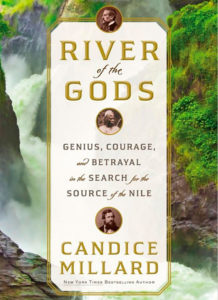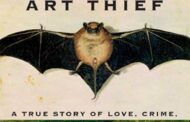Book Short
River of the Gods
Review by Stephanie Miller

In the early 19th Century, European powers were sending off waves of explorers to map the unknown corners of the world. Celebrated historian Candice Millard’s “River of the Gods: Genius, Courage, and Betrayal in the Search for the Source of the Nile,” is a fast-paced epic of wits, stamina, and raw courage. This is the true back story of how Henry Morgan Stanley came to remark, “Dr. Livingstone, I presume?”
Decades before that pithy exchange, experienced and charismatic Richard Burton invites John Hanning Speke to join him on an expedition to find the source of the Nile for the Royal Geographical Society of England. Burton spoke 29 languages, translated ancient poems, and was a decorated soldier. He was convinced that the source was a large, inland lake, despite lack of proof. Speke was a young socialite, a devotee of white European supremacy, and eager to make his mark. They were complete opposites in temperament and beliefs.
Their relationship was both codependent and fractious.
They suffered incredible hardships together, including an attack by local tribes where Speke was stabbed dozens of times and Burton shot and beaten. When infected by cholera and intestinal diseases, they gently nursed each other back to health. It was brutal: Speke actually loses some hearing after trying to dig out a beetle stuck in his ear canal.
Two years into the journey, running out of money and having lost most of their men to defection and theft, disease, and starvation, Burton is too sick to press on. Speke grabs the chance to lead on his own, arriving at what he later christened Lake Victoria. But with insufficient knowledge, leadership skills, or equipment, he is unable to find the river access.
Returning to England, Speke rushes ahead to the Society and takes credit for the discovery, usurping Burton and shifting their personal dislike into the public arena. Two years later, Speke is funded by the Society to return and prove his claims. He was right, but he again fails to find the source. Today, he is essentially lost to history.
Despite their venomous feud, it’s clear that neither could have done it without the other.
And in fact, neither actually did do it, although they made it possible for Livingstone to get close, and for Stanley to find him four years later.
There was a third man on all the trips, African Sidi Mubarak Bombay, a former child slave turned guide, whose strength, resourcefulness, and linguistic talents were essential to survival. Speke and Bombay stood together in front of the thousand-foot-wide roaring Victoria Waterfall. Twenty years later, Bombay joined Stanley to finally prove that Africa’s largest lake gives birth to the world’s longest river.
This is an astonishing true story of courage, single-minded purpose, and ego born of colonial arrogance. It focuses on the explorers’ character as much as their accomplishment. Under Millard’s skillful pen, it’s a wonderful history that reads like a novel.
Micro-Shorts
“Fierce Little Thing” by Miranda Beverly Wittemore
This is a mystery disguised as an eerie coming of age novel. Orphaned Saskia joins Home, a cult where she finally feels she found a family. Complete with a mad and charismatic leader, Home shapes her into a fiercely loyal devotee, taping and honing her own leadership abilities. Told out of sequence-which is a bit disconcerting to follow-you slowly begin to question who is influencing whom. Was Saskia evil before she got there, or have her memories been re-shaped by repeated tests of her character? A fast moving and slightly disturbing read.
“Face,” by Jean Tomer
I stop at every Little Free Library. Next to one at the Philadelphia airport is a kiosk that offers a short story on demand. I press the button for a one minute read and a passage from Tomer’s 1923 novel spits out. “Hair-silver gray, like streams of stars. Brows- recurved canoes quivered by the ripples blown by pain. Her eyes- mist of tears condensing on the flesh below and her channeled muscles are cluster grapes of sorrow, purple in the evening sun, nearly ripe for worms.”
“Something Is Out There,” by Richard Bausch
Stories are a snapshot of a life, the summation of character in concise prose. This collection of eleven short stories from an award-winning author are delightful in their mastery. We get to know people well in a few short pages. Some are likable. Most are striving. There is humor, joy, sadness, pain, and awakening. I enjoyed every one of them, pausing as at a great meal to savor each before tasting the next one.
Bayside resident Stephanie Miller is a voracious reader and bibliophile and spends a lot of time lost in the stacks of bookstores and libraries. Find her online @StephanieSAM.





